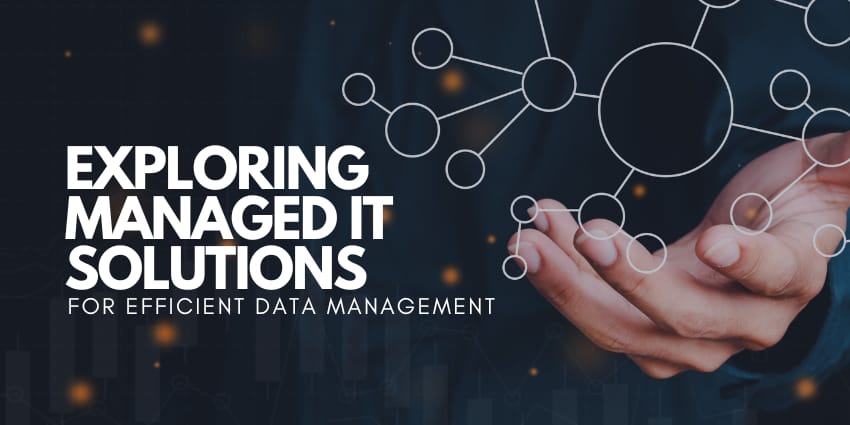As the volume of data continues to surge, the need for effective data management becomes paramount for businesses. Managed IT Solutions offer a comprehensive approach to handling the complexities of data management, ensuring businesses can harness the full potential of their information assets. In this blog, we’ll explore the benefits of Managed IT Solutions, and how Computer Support Professionals can help businesses streamline their data management processes, reduce costs, and improve productivity.
Best Practices for Effective Data Management
Before we dive into managed IT solutions, let’s review some best practices for successful data management:
Define Goals:
Establish comprehensive data governance policies to define roles, responsibilities, and procedures for data management. Clearly outline who owns the data, who has access, and how data quality and integrity are maintained.
Quality Assurance:
Regularly assess and improve data quality. Implement validation rules, conduct data cleansing activities, and establish processes to detect and rectify errors. High-quality data enhances decision-making and supports reliable analytics.
Regular Backups:
Establish a systematic and regular backup strategy to protect against data loss due to hardware failures, accidental deletion, or cyberattacks. Ensure backups are tested for reliability and can be restored promptly.
Access Controls:
Control access to data based on job roles and responsibilities. Limit access to sensitive information to only those who require it for their tasks. Implement strong authentication mechanisms to prevent unauthorized access.
Privacy Compliance:
Stay compliant with relevant data protection laws and regulations, such as GDPR, HIPAA, or CCPA. Regularly update privacy policies, educate staff on compliance requirements, and conduct audits to ensure adherence.
Metadata Management:
Maintain comprehensive documentation for datasets, including metadata (data about the data). This documentation should include information about data sources, definitions, formats, and relationships. It aids in understanding and utilising the data effectively.
Understanding Managed IT Solutions:
Managed IT Solutions involve outsourcing certain IT functions to a service provider, known as a Managed Service Provider (MSP). These services can encompass a variety of IT tasks, from network management and cybersecurity to data storage and backup. The goal is to allow businesses to offload the complexities of IT management, enabling them to concentrate on their strategic objectives.
Key Components of Managed IT Solutions for Data Management:
Managed IT Solutions play a crucial role in efficiently handling and optimising data management for businesses. Here are the key components of these solutions:
Data Security and Compliance:
Managed IT Solutions prioritize data security by implementing robust cybersecurity measures. This includes firewalls, antivirus software, and encryption to safeguard sensitive information. Compliance with industry regulations and data protection laws is also a key focus, ensuring that businesses adhere to legal requirements related to data handling.
Data Backup and Recovery:
The importance of data backup cannot be overstated. Managed IT Solutions provide automated and regular backup processes to prevent data loss in case of unforeseen events such as hardware failures, natural disasters, or cyberattacks. Quick and efficient data recovery mechanisms are also put in place to minimize downtime and ensure business continuity.
Cloud Services:
Cloud computing has revolutionized data management by providing scalable and flexible solutions. Managed IT Services often include cloud-based storage and computing services, allowing businesses to store, access, and manage their data more efficiently. This facilitates remote collaboration and ensures data accessibility from anywhere, at any time.
Network Infrastructure Management:
A robust network infrastructure is essential for seamless data flow within an organisation. Managed IT Solutions oversee the design, implementation, and maintenance of network architectures, optimising data transmission and ensuring a reliable and secure network environment.
Proactive Monitoring and Maintenance:
Preventive measures are key to avoiding potential IT disruptions. Managed IT solutions involve proactive monitoring of systems, applications, and networks to identify and address issues before they escalate. Regular maintenance and updates are performed to keep the IT infrastructure running smoothly.
Monitoring and Analytics:
The real-time monitoring tools to detect and respond to potential security threats promptly. Utilising data analytics for insights into data usage patterns, allowing for informed decision-making.
Benefits of Managed IT Solutions for Data Management:
Cost Efficiency:
Outsourcing IT functions through managed services can lead to significant cost savings. Businesses can avoid the upfront costs of hardware and software investments, while also benefiting from predictable monthly expenses.
Expertise and Support:
Managed IT Service providers bring a wealth of expertise and experience to the table. This allows businesses to access a team of skilled professionals who can navigate the complexities of data management and IT operations.
Disaster Recovery Planning:
Managed IT services include disaster recovery planning, ensuring that businesses are well-prepared for unforeseen events. This can involve data backup strategies, redundancy measures, and detailed recovery plans.
Focus on Core Competencies:
By offloading IT management tasks, businesses can concentrate on their core competencies and strategic initiatives. This enhances overall productivity and enables organisations to stay nimble in a fast-paced business environment.
Summary:
In conclusion, managed IT solutions play a vital role in efficient data management, providing businesses with the tools and expertise needed to navigate the complexities of modern technology. From data security and compliance to cloud services and network infrastructure management, these solutions empower organisations to focus on growth and innovation while leaving the intricacies of IT management to the experts. As businesses continue to embrace digital transformation, the adoption of managed IT solutions becomes not just a strategic choice but a necessity for sustained success in the competitive landscape.
Key Considerations When Choosing a Managed IT Solution Provider:
Experience and Expertise: Look for a provider with a proven track record and expertise in data management solutions.
Security Practices: Ensure the provider prioritizes data security and adheres to relevant industry standards.
Scalability and Flexibility: Choose a provider that can adapt to your current and future data management needs.
Communication and Transparency: Opt for a provider that prioritizes clear communication and keeps you informed about your data management practices.
Partnering with Computer Support Professionals:
Finding the right managed IT solution provider requires careful consideration. Partnering with experienced Computer Support Professionals specialising in this area can be crucial. They can assess your specific data management needs, analyze different provider options, and guide you toward the most suitable solution for your organisation.




